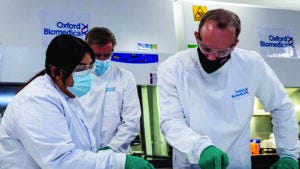- Sponsored Content
- Gene Therapies
Partnerships Are Crucial to Getting Advanced Treatments to MarketPartnerships Are Crucial to Getting Advanced Treatments to Market
April 19, 2022
Sponsored by Oxford Biomedica Solutions
 New treatments and approaches for tackling serious diseases are being developed using cell and gene therapy (CGT). CGTs are adding a new dimension to the way patients with such conditions can be treated in modern healthcare. But these advanced treatments require complex research, development, and manufacturing processes.
New treatments and approaches for tackling serious diseases are being developed using cell and gene therapy (CGT). CGTs are adding a new dimension to the way patients with such conditions can be treated in modern healthcare. But these advanced treatments require complex research, development, and manufacturing processes.
CGTs are related and to a degree interchangeable. However, gene therapies typically use some kind of genetic delivery system, (e.g., virus-based vectors) to treat a disease by replacing a malfunctioning gene or introducing a new gene into a patient’s body to alleviate a disease condition. Although cell therapy works in a similar manner, it usually involves modifying cells — whether from a patient or healthy donors — outside a patient’s body and then delivering those modified cells to a patient’s body to treat the disease.
Developing Partnerships
Based on 20 years of experience in the CGT field, I believe that one of the biggest challenges for these treatments comes in ensuring safety of the technology — in particular, the viral vectors commonly used to deliver genetic material into cells. Once safety is ensured, the next major challenge lies in making enough viral vectors to modify enough cells to treat the population of patients who have a disease.
The complexity of CGTs increases the value of developing partnerships with other organizations, joining forces to help increase the chance of a product getting to market. Oxford Biomedica’s partners benefit from our expertise on vector and cell engineering, analytical development, process development, and regulatory interactions with different agencies around the world.
Our internal expertise is unique in that respect because Oxford Biomedica also develops its own products. It was the first company to administer a lentivirus-vector–based product directly into patients. Many of the therapies in development at Oxford Biomedica are lentiviral vectored.
 Tackling Disease
Tackling Disease
Many CGTs are chimeric antigen receptor (CAR) T cells. Using CAR technology, human T cells (which are key immune cells) are modified to recognize cancerous cells and cause the immune system to attack and kill them, thereby removing a tumor. Oxford Biomedica makes lentiviral vectors used in genetically modifying normal T cells into cancer-killing CAR-T cells. In addition to developing its own CAR-T cell program targeting a particular tumor-associated antigen, the company is working with partners on similar therapies that target immune system diseases.
The same type of technology can be used for gene therapy by administering lentiviral vectors directly to patients. For example, a potential therapeutic approach to treating Parkinson’s disease is based on administering a vector that encodes dopamine-synthesizing enzymes directly to a patient’s brain.
COVID-19 Vaccine
Oxford Biomedica played a pivotal role in the manufacture of a COVID-19 vaccine with AstraZeneca, both having joined a manufacturing consortium led by the Jenner Institute at the University of Oxford in England. As the United Kingdom’s largest company specializing in viral vector development, manufacture, and analytics, Oxford Biomedica already had invested in innovation and manufacturing facilities. Thus, we could commit to the process at an early stage. We accelerated our plans and went from never having manufactured adenoviral vectors at scale to being one of the largest manufacturers of them.
 At the end of 2019, Oxford Biomedica had three manufacturing suites; now there are six. The company employs more than 740 people and has manufactured many tens of millions of doses of COVID-19 vaccine for AstraZeneca. What this experience highlights for me is the importance of companies with credible capabilities. It is not just about cleanrooms; you need the people, the knowledge, and the expertise to put those facilities to work in the most efficient way possible.
At the end of 2019, Oxford Biomedica had three manufacturing suites; now there are six. The company employs more than 740 people and has manufactured many tens of millions of doses of COVID-19 vaccine for AstraZeneca. What this experience highlights for me is the importance of companies with credible capabilities. It is not just about cleanrooms; you need the people, the knowledge, and the expertise to put those facilities to work in the most efficient way possible.
Innovating Together
Advanced-therapy medicinal products (ATMPs) — specifically viral-vectored gene and gene-modified cell therapies — are the primary focus of Oxford Biomedica. Using its unique LentiVector delivery platform, the company has created a valuable proprietary portfolio of CGT product candidates for oncology, central nervous system (CNS) disorders, and liver diseases. That has established my company’s reputation as a leading, fully integrated gene and cell therapy organization.
Oxford Biomedica has strong partnerships in place with a number of product developers, including Bristol-Myers Squibb, Boehringer Ingelheim, Beam Therapeutics, Arcellx, Cabaletta Bio, and Novartis, for which it serves as a contract development and manufacturing organization (CDMO). Oxford Biomedica is the global supplier of the lentiviral vector used in manufacturing Novartis’s Kymriah (tisagenlecleucel), the world’s first commercially approved CAR-T cell therapy product, which is sold in 30 countries. Oxford Biomedica also partners with early stage biotechnology companies to help develop their novel gene and cell therapies.
The company continues to invest in innovation — including platform technologies and product research and development — with a view to developing new ATMPs targeting unmet clinical needs. Recent announcements include broadening the leading viral vector offerings by incorporating the established adenoassociated virus (AAV) capabilities of Homology Medicines into a newly formed AAV manufacturing and innovation business in the United States: Oxford Biomedica Solutions LLC, based near Boston, MA. Oxford Biomedica will invest $50 million to fund the growth of that business, of which it will own 80%. Homology will own the remaining 20%, thus securing its status as a preferred key customer.
James Miskin, PhD, is chief technical officer at Oxford Biomedica, which he joined in 2000. He holds overall responsibility for the company’s quality systems, analytical testing, lentiviral bioprocess development, and client programs.
To discuss partnering for viral vector manufacturing, contact Oxford Biomedica plc, Windrush Court, Transport Way, Oxford OX4 6LT, UK; 44-1865-783-000; [email protected], https://www.oxb.com.
You May Also Like






